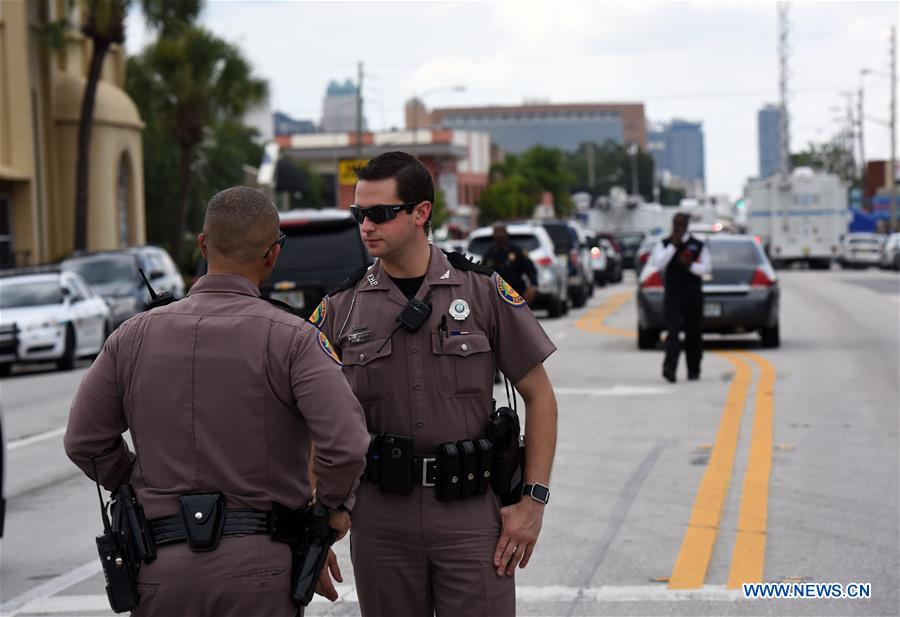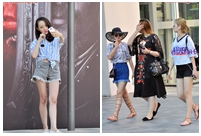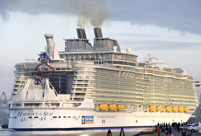


ORLANDO, June 13, 2016 -- Highway-patrol troopers stand guard near the mass shooting scene in Orlando, the United States, June 12, 2016. At least fifty people were killed and 53 others wounded early Sunday in a shooting spree at a gay nightclub in Orlando, Florida. (Xinhua/Yin Bogu)
ORLANDO, the United States, June 13 -- The city was in mourning.
Flags in front of all venues were flying half-staff, and every electronic billboard on the expressway was showing the same message: Pray for Orlando.
Home to the famous Disney World and Universal theme parks, "The City Beautiful" woke up Sunday morning to its worst nightmare.
Fifty people were gunned down, and at least another 53 were hospitalized. Orlando had witnessed the deadliest mass shooting in the history of the United States and the nation's worst terror attack since 9/11.
"I heard gunshots around 2:05 a.m.(0605 GMT), but thought it was fireworks," said 41-year-old Keaton Chad, who lives just a block away from the nightclub Pulse, where the massacre occurred.
Chad told Xinhua that the neighborhood was always nice and peaceful, and never for a moment did he think a horror like this would happen here.
Pulse was one of the biggest nightclubs in town and central to the city's Lesbian, Gay, Bisexual and Transgender (LGBT) community. Gunshots started when the club's weekly "Latin Night" was just wrapping up, and around 320 people were still hanging around for the last call.
The "fireworks" that Chad heard were just the beginning of the bloodshed.
Armed with an AR-15 assault rifle and a handgun, the assailant Omar Mateen opened fire at the people in the main hall. A three-hour standoff and hostage situation ensued, until the SWAT team shot and killed the suspect during actions to rescue the hostages.
The police had sealed all entries to Pulse starting from 6:30 a.m.(1030 GMT) Sunday. Looking from a makeshift media center, a white container truck had blocked any possible view of the nightclub.
A guarding officer told Xinhua that the club was a lower building and would not be accessible until the roads re-open after the crime scene was thoroughly investigated.
Several miles away from the club, the Orlando Regional Medical Center was also on lockdown with a police vehicle blocking the entrance. Many of the casualties were rushed to the center after the shooting.
Three regional medical facilities had accepted those who were injured for treatment, and a call to donate types O negative, O positive and AB plasma was made.
Several local blood banks were flooded with people wanting to donate blood Sunday evening, despite the pouring rain.
At the OneBlood blood bank, dozens of people had been lining up to donate plasma. Some of them came as early as 9 a.m.(1300 GMT).
According to a blood bank worker, the blood bank was overwhelmed by more than 2,000 people who had registered to donate on Sunday. The bank had to ask donors to come back later over the next few days.
"This is probably the most difficult day in the history of Orlando," said Orlando Mayor Buddy Dyer in a news conference.
"We need to support each other. We need to love each other, and we will not be defined by a hateful shooter. We will be defined by how we support each other," Dyer added.
After nightfall, survivors, friends of the victims and members of the city's LGBT community gathered by the city's iconic Lake Eola to hold a vigil for the deceased and injured.
People lit candles, wove reed leaves into roses, and put yellow chrysanthemum flowers onto the lake bank lawn. They embraced and consoled one another.
"This situation was very tragic for me and a lot of my friends," said Arron Candelaria, who came and spoke at the vigil.
"I want to show my faith and support my community, and I feel this community will grow bigger and better than what it already is," Candelaria said.
 Five made-in-China hi-tech breakthroughs
Five made-in-China hi-tech breakthroughs Beijing Style: Hot pants
Beijing Style: Hot pants HK-Zhuhai-Macao Bridge to open to traffic
HK-Zhuhai-Macao Bridge to open to traffic China opens its first combined transport service to Nepal
China opens its first combined transport service to Nepal Students take stylish bikini graduations photos
Students take stylish bikini graduations photos Charming dancing students pose for graduation photos
Charming dancing students pose for graduation photos Guizhou, Yunnan section of Shanghai-Kunming railway connected
Guizhou, Yunnan section of Shanghai-Kunming railway connected Naked models transformed into landscapes, birds and even DRAGONS by body painting artist
Naked models transformed into landscapes, birds and even DRAGONS by body painting artist World’s biggest cruise ship Harmony of the Seas to start maiden voyage
World’s biggest cruise ship Harmony of the Seas to start maiden voyage Top 20 hottest women in the world in 2014
Top 20 hottest women in the world in 2014 Top 10 hardest languages to learn
Top 10 hardest languages to learn 10 Chinese female stars with most beautiful faces
10 Chinese female stars with most beautiful faces China’s Top 10 Unique Bridges, Highways and Roads
China’s Top 10 Unique Bridges, Highways and Roads Live streamer stirs up controversy by playing a woman
Live streamer stirs up controversy by playing a woman Avoiding middle-income trap relies on Chinese reforms
Avoiding middle-income trap relies on Chinese reforms Q&A site becoming platform for celebrity gossip experts
Q&A site becoming platform for celebrity gossip experts Protests erupt over college enrollment for minorities at Beijing high school
Protests erupt over college enrollment for minorities at Beijing high schoolDay|Week